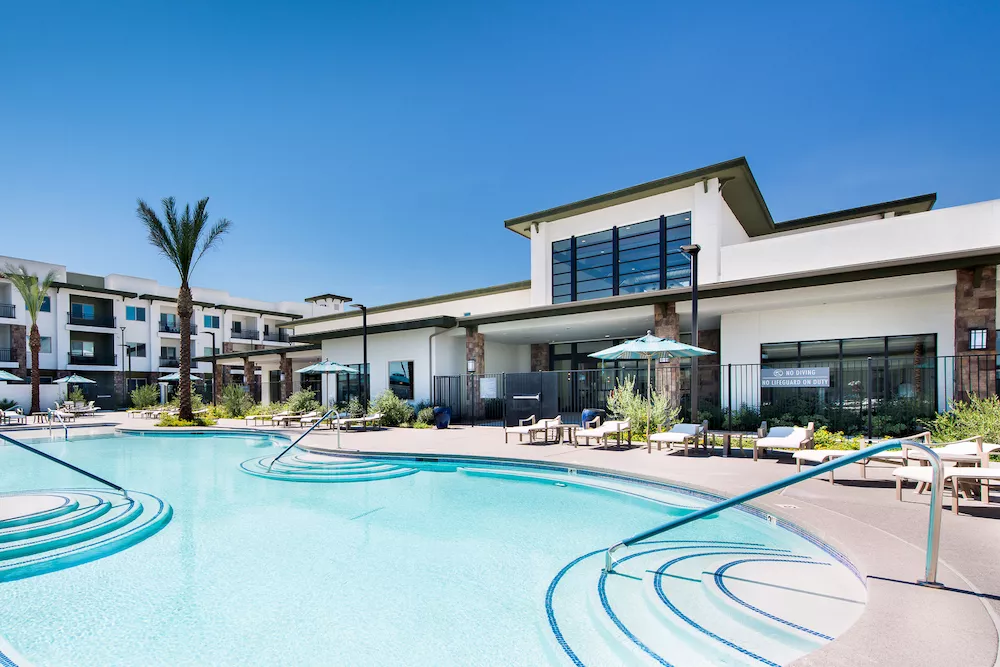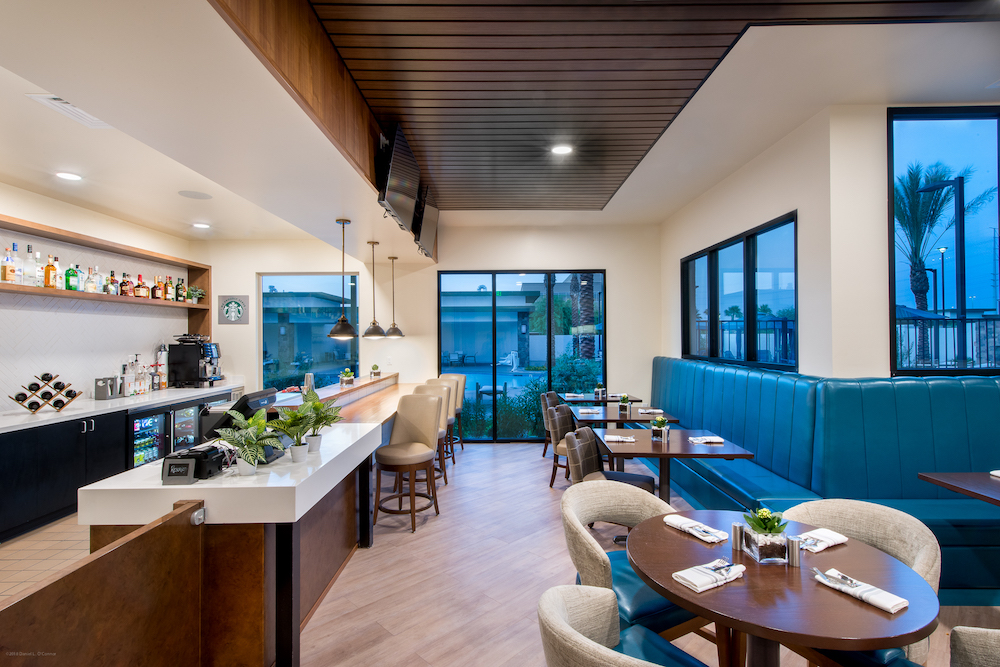In 2016, private equity-backed multifamily real estate firm The Wolff Company announced an ambitious senior living development pipeline. Now, with three Revel-branded independent living projects open and 14 more in the works, Wolff is taking over ongoing management of the properties as well. The company has tapped a heavy-hitter from the hospitality world to lead this effort: Niki Leondakis, former president and COO of Kimpton Hotels and Restaurants, known for pioneering the “boutique hotel” concept.
In addition to her nearly 20-year tenure with Kimpton, Leondakis has served as CEO of Equinox Fitness Clubs and CEO of Two Roads Hospitality, a hotel company founded by John Pritzker, whose family started Hyatt hotels.
“I’ve always been focused on the service side of the business, the delivery side, and in lifestyle and boutique hotels, how you program the environments to engage people so that they’re feeling connected and a part of things, learning and discovering,” Leondakis told Senior Housing News. “All the experiences I’ve had, I really felt could be applied in a way that would inspire these [Revel] living environments to break through into a whole new way of helping our residents live longer and healthier and happier.”
Up to this point, Wolff’s Revel communities have been operated by Newport Beach, California-based Clearwater Living. Now, management of the communities is transitioning to the as-yet-unnamed “senior living resident experience company” being led by Leondakis.
Wolff and Clearwater are “well-aligned” on the timing of this transition, because it will enable Clearwater to step away from third-party management to focus on its own development pipeline, according to a news release issued Tuesday. Clearwater intends to develop two to three communities each year, President and COO Danielle Morgan told SHN last June.
However, Wolff and Clearwater will continue to work together. They plan to create campuses with the full continuum of care, with Revel independent living complemented by Clearwater assisted living and memory care communities. The companies are not yet ready to announce any of these campus projects, Leondakis said.
There has always been cross-pollination between the hospitality and senior living industries. Recently, senior living owners and operators have been adopting hospitality practices such as dynamic pricing and multi-brand portfolios. With Leondakis on board, Revel communities now become a focal point for how a top hospitality industry leader might refresh and elevate senior living operations — a challenge that Leondakis is embracing.
Beyond boutique
Having just started in her new position, Leondakis said her immediate priorities are ensuring that the transition in management does not cause any disruption in services for residents, and building out a team.
Corey Wolfenbarger will be in charge of operations for the new management platform. Previously, Wolfenbarger oversaw asset management for Wolff’s senior living portfolio, and he came up in the industry with Emeritus Corp. and Brookdale Senior Living (NYSE: BKD). Nicole Sinclair has also joined Leondakis’ team. Sinclair will lead talent and culture, and she has more than 25 years of experience in hospitality, including with Starwood Hotels and Resorts.
“We’re forming a new team to take the experience of the senior and seasoned leadership here at Wolff and combine that with the experience of some leaders, like myself, from other industries,” Leondakis said.
In terms of what her experience consists of, specifically, Leondakis was at the forefront of a major shift in the hotel industry during her time with Kimpton, and she sees parallels in senior living.
Two or three decades ago, hotel guests prized consistency above all, she explained. Both business and leisure customers wanted to know exactly what accommodations, amenities, food and level of service they could expect. Hotel chains developed a business model to meet these demands, focused on replicability.
Now, it’s a different story.
“That predictability and sameness is a deterrent today,” Leondakis said. “In hotels, people want to learn new things, discover the history, culture, traditions, norms in a specific, not just city, but neighborhood, community.”
During her time at Kimpton, Leondakis both responded to and helped drive this evolution in hotels. Bill Kimpton founded the company in 1981 in San Francisco, where he opened his first hotel with the goal of making it more unique and homelike than the dominant, cookie-cutter options. The “boutique hotel” concept was born. Bill Kimpton passed away in 2001, while Leondakis was running the company’s restaurant division. She went on to assume the president role, and she remained with Kimpton until 2012.
Today, Kimpton’s portfolio has grown to 65 hotels across 30 cities. And the “boutique hotel” model has given rise to other concepts, such as “lifestyle hotels.”
“Lifestyle hotels have no choice but to lay a stake in the ground and declare what they are and to whom,” Leondakis said.
They accomplish this by curating experiences for their guests — often around specific themes or shared interests, such as wellness or art — and fostering connections among customers, staff and the community at large. For example, 21c Museum Hotels co-locate contemporary art museums, boutique hotels and chef-driven restaurants.
Consumers of all ages share this expectation and hunger for experiences and connection, so the lifestyle hotel approach can and should carry over into senior living, Leondakis believes. This is one reason why Wolff is calling its operating arm a “resident experience company” rather than a management company.
“Our vision, in our communities, is to bring people into the communities while they’re still seeking to enjoy life and they’re vibrant and they’re seeking to learn, discover and collect experiences,” Leondakis said. “The way we design the physical environments and create community so people feel emotionally connected, there’s a lot of synergy [with lifestyle hotels].”
The Revel experience
It is too early to share details of what the Revel lifestyle experience might ultimately involve, Leondakis said, but she did describe some of the main pillars of the operating model, including wellness, dining and technology.
From the outset, Wolff has positioned Revel as an upscale brand targeting a younger, affluent senior. Revel Nevada, for instance, features multiple dining venues, a wellness center and spa, salon, yoga studio, gym and heated saltwater pool, among other amenities. Located in the Las Vegas suburb of Henderson, the 146-unit building is one of three Revel properties currently open.
As amenities like spas and yoga studios illustrate, wellness will be a linchpin of the resident experience going forward, Leondakis said. She and her team are in the process of defining what “wellness” means in the context of Revel, but they are developing a multi-dimensional approach, going beyond just physical wellness.
In creating a wellness program for Wolff, Leondakis can draw on her previous experience as the CEO of Equinox Fitness Clubs. Equinox is more than just a gym, she emphasized. An important aspect of the Equinox experience is how the clubs bring a community of members together to inspire each other to work on their fitness, health and wellbeing.
“There’s a social aspect to it,” Leondakis said. “There’s definitely a thread that runs through hospitality, fitness clubs and the senior living resident experience.”
Leondakis left Equinox last July. In October, Equinox’s parent organization, real estate development firm Related Companies, announced a joint venture to create a new senior living brand with Louisville-based operator Atria Senior Living.
Having led Kimpton’s restaurant business, Leondakis also has extensive past experience with dining.
“[At Kimpton] we were trying to create restaurants that were serving the needs of the local community and were chef-driven and unique,” she said.
In other words, Kimpton’s dining program was not designed around the businessman arriving at 9 p.m. and ordering a club sandwich, she explained. In 1983, Kimpton launched a wine-themed hotel, and in 1989 was one of the first hotel companies to partner with a celebrity chef, when Wolfgang Puck opened a restaurant at a Kimpton in San Francisco.
Revel already has its own celebrity chef, Beau MacMillan, who has appeared on several Food Network series. MacMillan is the executive chef designing the Revel culinary experience across multiple venues in each community, while Sodexo is managing operational aspects of dining.
“We’re going to bring that chef-driven focus as we continue to expand and grow Revel, and we’ll apply a market-specific approach to food and beverage,” Leondakis said.
With many Wolff investors based in Silicon Valley, the company is not afraid of technology or innovation. Here again, Leondakis has a reference point from her hotel background to help guide decisions.
“Another aspect of lifestyle hotels … is personalization and high-touch experience,” she said. “If we can leverage tech to create a more high-touch, connected experience — the feeling you know me and I’m being cared for in a personalized way — we will leverage that.”
Although this sense of personalized care is a goal, Leondakis is clear on one point: Revel is independent living, and so robust health care will not be a main focus of the operations. The ongoing relationship with Clearwater will create some options for residents as their needs increase, but Leondakis’ mandate is to elevate the hospitality approach for more independent seniors. She does bring a sense of mission to this job, though, having taken the lead in finding a home for her mother after her father passed away.
“I got a glimpse into the industry through that experience a few years ago,” she said. “To focus on transforming that experience for seniors at every touchpoint, I could see where for me personally, the mission part of the business model would be something I would find joy in, and with my hospitality background, could make a difference.”
Companies featured in this article:
Clearwater Living, Equinox, Kimpton Hotels, Sodexo, The Wolff Company





